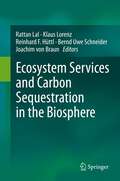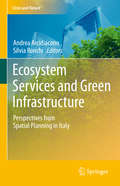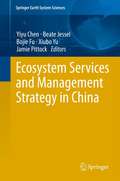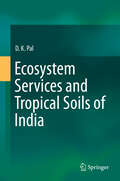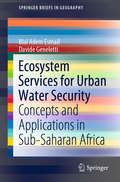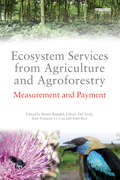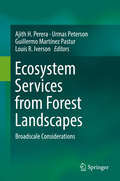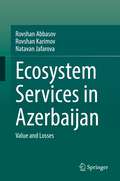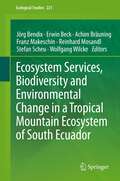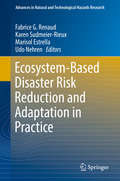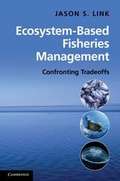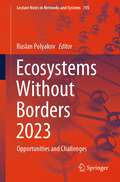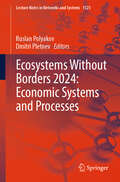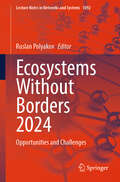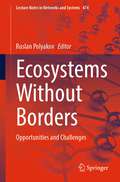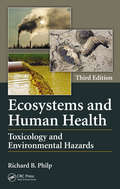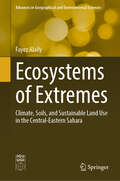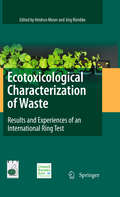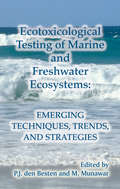- Table View
- List View
Ecosystem Services and Carbon Sequestration in the Biosphere
by Klaus Lorenz Rattan Lal Joachim Von Braun Reinhard F. Hüttl Bernd Uwe SchneiderEcological functions and human wellbeing depend on ecosystem services. Among the ecosystem services are provisional (food, feed, fuel, fiber), regulating (carbon sequestration, waste recycling, water cleansing), cultural (aesthetic, recreational, spiritual), and supporting services (soil formation, photosynthesis, nutrient cycling). Many relationships of various degree exist among ecosystem services. Thus, land use and soil management to enhance biospheric carbon sinks for carbon sequestration requires a comprehensive understanding on the effects on ecosystem services. Payments for ecosystem services including carbon pricing must address the relationship between carbon sequestration and ecosystem services to minimize risks of overshoot, and promote sustainable use of land-based carbon sinks for human wellbeing.
Ecosystem Services and Green Infrastructure: Perspectives from Spatial Planning in Italy (Cities and Nature)
by Silvia Ronchi Andrea ArcidiaconoThe book analyses the relationship between ecosystem services, green and blue infrastructures (GBI) and spatial planning in Italy. It provides insights on the opportunities and challenges in the adoption of an ecosystem services (ES)-based approach for Spatial Planning exploring methods and techniques for the design of GBI strategies. Nowadays, there is an advance in ES knowledge and a recognition of the benefits of GBI for the quality of human life and biodiversity conservation. The main challenge remains how this knowledge could be integrated into the planning process and how it could guide the decision-making process towards sustainable development for contemporary cities. The book collects innovative Italian experiences providing important considerations for operationalizing the ES concept and highlighting different disciplinary attitudes and methodological approaches with the common goal to enhance human well-being.
Ecosystem Services and Management Strategy in China
by Jamie Pittock Yiyu Chen Beate Jessel Bojie Fu Xiubo Yu"Ecosystem Services and Management Strategy in China" is a two-year international cooperation project that culminated from the China Council for International Cooperation on Environment and Development's Task Force on Ecosystem Services and Management. It combines case studies, scenario analysis, and stakeholder consultations that focus on Chinese forest, grassland and wetland ecosystems and assesses the economic and social benefits of sustainable ecosystems management. It also identifies better practices in ecosystem management from Chinese and international experience and recommends a more intensive integration of ecosystem services into decision-making processes. In November 2010, the Task Force presented five strategic policy proposals for the implementation of sustainable management for Chinese ecosystems. These proposals were extremely well-received by senior decision makers and have since been adopted by national government agencies. The book represents a valuable reference work for researchers and professionals working in related areas. Professor Yiyu Chen worked as president at the National Natural Science Foundation of China from 2004 to early 2013 and is Member of the Chinese Academy of Sciences. Professor Beate Jessel works as president at the Federal Agency for Nature Conservation, Germany. Professor Bojie Fu works at the Research Center of Eco-Environment Sciences, CAS and is Member of the Chinese Academy of Sciences. Professor Xiubo Yu works at the Institute of Geographic Sciences and Natural Resources Research, Chinese Academy of Sciences. Dr.Jamie Pittock is a Senior Lecturer at the Fenner School of Environment and Society, Australian National University, Australia.
Ecosystem Services and Tropical Soils of India
by D.K. PalThis book highlights ecosystem services of Indian tropical soils driven by soil properties. Soils are complex and important biomaterials and have an outstanding role in providing ecosystem services to mankind. The tropical soils have been traditionally and generally considered as either agriculturally poor or virtually useless by many. This book will discuss the difficulties encountered in managing Indian tropical soils in order to sustain their productivity. Some unique soil properties are yet to be linked explicitly to soil ecosystem services and soil care needs to be a constant research endeavour in the Indian tropical environment. This book highlights the new and unique soil knowledge base necessary to close the gap between food production and future population growth.
Ecosystem Services for Urban Water Security: Concepts and Applications in Sub-Saharan Africa (SpringerBriefs in Geography)
by Davide Geneletti Blal Adem EsmailThe book addresses the challenges of urban water security and adaptive management in Sub-Saharan Africa, exploring and interlinking novel concepts of ecosystems services, watershed investments, and boundary work. Specifically, the book’s goals are to (i) present a conceptual framework for the urban water sector from an ecosystem services perspective, highlighting the specificities of the Sub-Saharan context; (ii) develop an operational approach to designing and assessing the impacts of watershed investments, based on ecosystem services and boundary work; and (iii) test the approach through a case study in Asmara, Eritrea, and discuss the findings and lessons learned that can be applied in other contexts. Through a fully worked out case study, from identification of water challenges and opportunities to spatially explicit modelling, the book offers a sound and accessible, coverage of issues and proposed solutions to better operationalize ecosystem services, watershed investments and boundary work, to promote adaptive management, and achieve water security in the context of rapidly developing cities in Sub-Saharan Africa. The book is an effective tool for capacity building of diverse stakeholders on the urban water sector, including water managers, local and national policy-makers as well as a suitable resource for both undergraduate and post-graduate courses in planning and geography.
Ecosystem Services from Agriculture and Agroforestry: Measurement and Payment (Routledge Studies in Ecosystem Services)
by John Beer Fabrice DeClerk Jean Francois Le Coq Bruno RapidelAgricultural systems are no longer evaluated solely on the basis of the food they provide, but also on their capacity to limit impacts on the environment, such as soil conservation, water quality and biodiversity conservation, as well as their contribution to mitigating and adapting to climate change. In order to cope with these multiple service functions, they must internalize the costs and benefits of their environmental impact. Payments for ecosystem services are hoped to encourage and promote sustainable practices via financial incentives. The authors show that while the principle is straightforward, the practice is much more complicated. Whereas scenic beauty and protection of water sources provide benefits to the local population, carbon sequestration and biodiversity conservation can be considered international public goods, rendering potential payment schemes more complex. Few examples exist where national or international bodies have been able to set up viable mechanisms that compensate agricultural systems for the environmental services they provide. However this book provides several examples of successful programs, and aims to transfer them to other regions of the world. The authors show that a product can be sold if it is clearly quantified, there exists a means to determine the service's values, and there is a willing buyer. The first two sections of the book present methodological issues related to the quantification and marketing of ecosystem services from agriculture, including agroforestry. The third and final section presents case studies of practical payments for ecosystem services and experiences in Central and South America, and draws some lessons learnt for effective and sustainable development of ecosystem services compensation mechanisms.
Ecosystem Services from Forest Landscapes: Broadscale Considerations
by Ajith H. Perera Urmas Peterson Guillermo Martínez Pastur Louis R. IversonOver the last two decades, the topic of forest ecosystem services has attracted the attention of researchers, land managers, and policy makers around the globe. The services rendered by forest ecosystems range from intrinsic to anthropocentric benefits that are typically grouped as provisioning, regulating, supporting, and cultural. The research efforts, assessments, and attempts to manage forest ecosystems for their sustained services are now widely published in scientific literature. This volume focuses on broad-scale aspects of forest ecosystem services, beyond individual stands to large landscapes. In doing so, it illustrates the conceptual and practical opportunities as well as challenges involved with planning for forest ecosystem services across landscapes, regions, and nations. The goal here is to broaden the scope of land use planning through the adoption of a landscape-scale approach. Even though this approach is complex and involves multiple ecological, social, cultural, economic, and political dimensions, the landscape perspective appears to offer the best opportunity for a sustained provision of forest ecosystem services.
Ecosystem Services in Azerbaijan: Value and Losses
by Rovshan Abbasov Rovshan Karimov Natavan JafarovaThis book aims to draw readers' attention to the benefits once present nature in Azerbaijan. Over the past hundred years, much of this has been lost because of the neglect of the intrinsic values of nature by both managers and local authorities, and the overuse of natural resources. For example, oil pollution and overfishing in the Caspian Sea have almost destroyed its fish and caviar resources. In this volume, the authors distinguish between the concepts of "gain" and "income" and show readers that short-term benefits based solely on monetary income deprive people and nature itself of long-term, lasting value. The book provides readers with real historical information, discusses the interactions between humans and nature, and shows, with real data and trends, the consequences of anthropogenic activity on natural resources in Azerbaijan. The authors cover fish, water, forest, mountain, and pasture ecosystems, draw attention to the impacts that pollution and other forms of environmental degradation have had on these resources, and the show the impact that resource depletion on people’s livelihoods. The book is intended primarily for managers, policymakers, students, and academics, and will be of interest to natural scientists, historians, and students of culture.
Ecosystem Services, Biodiversity and Environmental Change in a Tropical Mountain Ecosystem of South Ecuador
by Erwin Beck Reinhard Mosandl Achim Bräuning Franz Makeschin Jörg Bendix Stefan Scheu Wolfgang WilckeAn interdisciplinary research unit consisting of 30 teams in the natural, economic and social sciences analyzed biodiversity and ecosystem services of a mountain rainforest ecosystem in the hotspot of the tropical Andes, with special reference to past, current and future environmental changes. The group assessed ecosystem services using data from ecological field and scenario-driven model experiments, and with the help of comparative field surveys of the natural forest and its anthropogenic replacement system for agriculture. The book offers insights into the impacts of environmental change on various service categories mentioned in the Millennium Ecosystem Assessment (2005): cultural, regulating, supporting and provisioning ecosystem services. Examples focus on biodiversity of plants and animals including trophic networks, and abiotic/biotic parameters such as soils, regional climate, water, nutrient and sediment cycles. The types of threats considered include land use and climate changes, as well as atmospheric fertilization. In terms of regulating and provisioning services, the emphasis is primarily on water regulation and supply as well as climate regulation and carbon sequestration. With regard to provisioning services, the synthesis of the book provides science-based recommendations for a sustainable land use portfolio including several options such as forestry, pasture management and the practices of indigenous peoples. In closing, the authors show how they integrated the local society by pursuing capacity building in compliance with the CBD-ABS (Convention on Biological Diversity - Access and Benefit Sharing), in the form of education and knowledge transfer for application.
Ecosystem Services: Economics and Policy (Palgrave Studies in Natural Resource Management)
by Stephen MuddimanThis book bridges the gap between economic and ecological theory and practice. Its main focus is on how the principles of the Austrian School of economics could improve the validity of Ecosystem Services.The concept of ‘Ecosystem Services’ is a relatively recent innovation in environmental thought. The current system is dependent upon mainstream economic theory, in which monetary and fiscal policy controls the prevailing health of the economy. The dependence on this approach to finance, Muddiman argues, limits the potential of ecosystem services and exacerbates the effects of the existing flawed economic model. The book highlights the links between ecological and economic methodologies and concepts and outlines how the principles of Austrian Economic theory could provide better environmental outcomes. It then goes on to formulate approaches to ecosystem services which could act as drivers towards a new biodiversity-based economic framework built around distributed ledger technology, or ‘blockchain’. The key distinction of this book is its consideration of ecosystem services as a function of the current economic system. Using this as a starting point it investigates how an alternative economic model would achieve the integration of environmental considerations into economic decision making.
Ecosystem-Based Disaster Risk Reduction and Adaptation in Practice
by Fabrice G. Renaud Karen Sudmeier-Rieux Marisol Estrella Udo NehrenThis book is a compilation of recent developments in the field of ecosystem-based disaster risk reduction and climate change adaption (Eco-DRR/CCA) globally. It provides further evidence that ecosystem-based approaches make economic sense, and showcases how research has progressively filled knowledge gaps about translating this concept into practice. It presents a number of methods, and tools that illustrate how Eco-DRR/CCA has been applied for various ecosystems and hazard contexts around the world. It also discusses how innovative institutional arrangements and policies are shaping the field of Eco-DRR/CCA. The book is of relevance to scientists, practitioners, policy-makers and students in the field of ecosystem management for disaster risk reduction and climate change adaptation.
Ecosystem-Based Fisheries Management
by Jason S. LinkResponsible fisheries management is of increasing interest to the scientific community, resource managers, policy makers, stakeholders and the general public. Focusing solely on managing one species of fish stock at a time has become less of a viable option in addressing the problem. Incorporating more holistic considerations into fisheries management by addressing the trade-offs among the range of issues involved, such as ecological principles, legal mandates and the interests of stakeholders, will hopefully challenge and shift the perception that doing ecosystem-based fisheries management is unfeasible. Demonstrating that EBFM is in fact feasible will have widespread impact, both in US and international waters. Using case studies, underlying philosophies and analytical approaches, this book brings together a range of interdisciplinary topics surrounding EBFM and considers these simultaneously, with an aim to provide tools for successful implementation and to further the debate on EBFM, ultimately hoping to foster enhanced living marine resource management.
Ecosystems Without Borders 2023: Opportunities and Challenges (Lecture Notes in Networks and Systems #705)
by Ruslan PolyakovThe book in your hands is a collection of papers delivered at the II International Conference "Ecosystems Without Borders: Opportunities and Challenges" held at Kaliningrad State Technical University in February 2023.The materials include studies reflecting the transformation of ecosystems, both in innovative development and in science, technology and business, as well as the spatial aspects of ecosystems and features of the formation of a creative class in ecosystem conditions. In addition, the book includes theoretical articles, which aim to implement the ideas of sustainable development and circular economy. The book is intended for a wide range of readers, including practicing economists, students, graduate students and researchers, as well as government officials and company managers. We are confident that our book serves as an important source of information and knowledge that leads to scientific and innovative progress in the field of sustainable development of society.
Ecosystems Without Borders 2024: Economic Systems and Processes (Lecture Notes in Networks and Systems #1521)
by Ruslan Polyakov Dmitri PletnevThis book presents selected papers from the V International Scientific and Practical Conference &“Ecosystems without Borders&” held at Kaliningrad State Technical University, Kaliningrad, Russia, October 2–3, 2024. Materials of the book &“Ecosystems without Borders: Economic Systems and Processes&” include theoretical and spatial aspects of ecosystems, peculiarities of formation of the creative class in these conditions, as well as studies reflecting the transformation of ecosystems, both in innovative development and in science, technology and business. This book includes articles reflecting the latest scientific trends aimed at realizing the ideas of sustainable development and circular economy. This book is of interest to a wide range of readers, practicing economists, students, graduate students, and researchers, as well as government officials and managers of companies.
Ecosystems Without Borders 2024: Opportunities and Challenges (Lecture Notes in Networks and Systems #1092)
by Ruslan PolyakovThis book is a continuation of a series of presentations given at the III International Conference "Ecosystems Without Borders: Opportunities and Challenges" held at the Kaliningrad State Technical University in September 2023. The book presents research reflecting the transformation of ecosystems in the context of innovative development, science, technology and business. It also considers spatial aspects of ecosystems and the peculiarities of the formation of the creative class in the context of ecosystems. Theoretical articles aimed not only at the realization of the ideas of sustainable development in the economy but also at the realization of the ideas of structural transformation of innovation processes. The book is useful to a wide range of readers: practicing economists, students, graduate students and researchers, as well as government officials and company managers. The authors are confident that this book will serve as an important source of information and knowledge that will contribute to scientific and innovative progress in the field of sustainable development of society.
Ecosystems Without Borders: Opportunities and Challenges (Lecture Notes in Networks and Systems #474)
by Ruslan PolyakovThis book presents selected papers from the II International Conference "Ecosystems without Borders 2021", held at Kaliningrad State Technical University in Kaliningrad, Russia on October 5–7, 2021.Materials of the book "Ecosystems without Borders - Opportunities and Challenges" include theoretical and spatial aspects of ecosystems, features of the formation of a creative class in these conditions, as well as studies reflecting transformation of ecosystems, both in terms of innovations and in science, technology and business.This book will be of interest to a wide range of readers, such as practicing economists, students, graduate students and researchers, as well as government employees and company managers.
Ecosystems and Human Health: Toxicology and Environmental Hazards, Third Edition
by Richard B. PhilpSince the second edition of this text was published, many new environmental incidents have occurred, including another nuclear disaster, a mine disaster in the United States, and the Gulf of Mexico oil spill. Updated throughout the text, Ecosystems and Human Health: Toxicology and Environmental Hazards, Third Edition explores the broad range of env
Ecosystems and Integrated Water Resources Management in South Asia
by E. R. N. Gunawardena; Brij Gopal; Hemesiri KotagamaThis book provides an ecosystem perspective in addressing the water resource management issues in the South Asian region. It argues that aspects such as sources of water, its distribution and users; land–water interrelations; drivers of change such as laws, policies and institutions; management of issues and technologies related to water supply; institutional set-up; economic instruments such as pricing, taxes, subsidies; and economics of ecosystem services are crucial. Climate changes, melting of glaciers and polar ice caps, rising sea level and the increased frequency of extreme events, have to be factored into integrated management of water resources. This book addresses some of these major issues related to aquatic ecosystems and focuses on three major aspects: (a) concepts related to ecosystems, ecosystem services and their linkages with water; (b) human impacts on ecosystems, particularly the aquatic ecosystems, and their assessment; and (c) the management, including policy, governance and economics. Comprising new theories, research and case studies, the book will be useful those concerned with water resource management – professionals, students and researchers.
Ecosystems of Extremes: Climate, Soils, and Sustainable Land Use in the Central-Eastern Sahara (Advances in Geographical and Environmental Sciences)
by Fayez AlailyThis book explores the environmental conditions, particularly the climate and soils, of one of the driest regions on earth, the Central-East of the Sahara. These factors control the ecosystems and determine the land's suitability for use. The area receives only 0.5 mm of precipitation annually and contains one of the largest aquifers in the Sahara, with fossil groundwater. The region's lithology includes Cretaceous formations and crystalline rocks, largely covered by quaternary sediments. Exogenous activities have shaped various landscape types, such as ergs with different dunes, deflated depressions with playas, and yardangs. Soils in the region are primarily formed through physical processes and are often shallow, sandy, and enriched with soluble salts. The book provides a detailed analysis of their physical and chemical properties, genesis, and relation to environmental factors and sociological aspects. It also discusses rare ecosystems, including those dependent on food imports and those that arise episodically and last for a few years. Considering all ecological parameters, a land assessment system for irrigated agriculture is developed, along with descriptions of suitable cultivation methods and optimal irrigation systems. The book's contents are based on data from several expeditions and laboratory work funded by the German Research Foundation.
Ecotoxicity of Chemicals to Photobacterium Phosphoreum
by K. L. E. Kaiser J. DevillersEach volume in the series focuses on a particular taxon, presenting detailed and reliable ecotoxicological results from both laboratory and field experiments, performed for a comprehensive range of chemicals. A taxonomical guide to the species is given, together with relevant biological and ecological information.In recent times much attention has been focused on the effects of anthropogenic emissions of chemicals. This series is unique in providing a considered estimate of the potential impact of such chemicals on the environment.
Ecotoxicological Characterization of Waste
by Heidrun Moser Jörg RömbkeAccording to the European Waste List, waste must be characterized as ecotoxicologically hazardous or not. This book provides the background, organization, methods, results and recommendations regarding this specific classification and assessment of waste.
Ecotoxicological Testing of Marine and Freshwater Ecosystems: Emerging Techniques, Trends and Strategies
by M. Munawar P.J. den BestenFocusing on state-of-the-art biological testing and methods used for aquatic ecosystem health assessment, Ecotoxicological Testing of Marine and Freshwater Ecosystems evaluates the latest bioassay techniques and different types of water and sediment quality assessments. The book also explores multi-tiered approaches to making recommendations for th
Ecotoxicology and Chemistry Applications in Environmental Management (Applied Ecology and Environmental Management)
by Sven Erik JorgensenEcotoxicology and Chemistry Applications in Environmental Management describes how to set up an integrated, holistic approach to addressing ecotoxicological problems. It provides detailed explanations in answer to questions like "Why is it necessary to apply an integrated approach?" and "How does one apply an integrated environmental management approach?" Highlighted topics of the book include Environmental chemical calculations QSAR estimation methods Toxic substance interference with other environmental problems Using diagnostic ecological subdisciplines for solutions Cleaner production methods and technologies Environmental risk assessment Addressing one of the most difficult tasks today, this book provides a much-needed holistic view for translating scientific knowledge and research results into effective environmental management measures. Rooted in a seven-step method, it integrates examination and quantification of an environmental problem and describes the use of ecological diagnostic tools to develop a diagnosis for ecosystem health. It also presents methods for choosing and using solutions or combinations of solutions to tackle problems.
Ecotoxicology of Amphibians and Reptiles
by Christine A. Bishop Donald W. Sparling Greg Linder Sherry K. KrestBuilding on the success of its popular predecessor, the second edition of Ecotoxicology of Amphibians and Reptiles presents newly available findings on the species that are important environmental indicators. This new edition covers nearly twice as many topics as the first, including recent developments in the ecotoxicology of amphibians and reptil
Ecotoxicology of Explosives
by Geoffrey I. Sunahara Guilherme Lotufo Roman G. Kuperman Jalal HawariManaging sites contaminated with munitions constituents is an international challenge. Although the choice of approach and the use of Ecological Risk Assessment (ERA) tools may vary from country to country, the assurance of quality and the direction of ecotoxicological research are universally recognized as shared concerns. Drawing on a multidiscip
